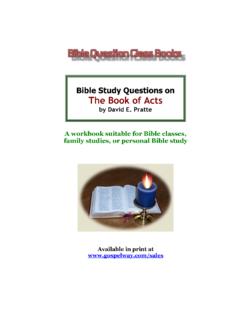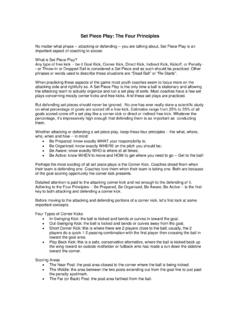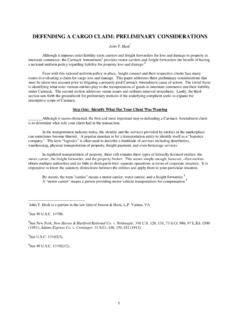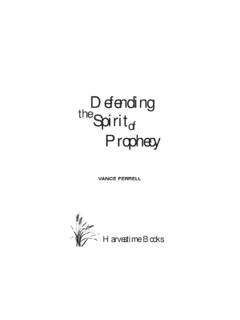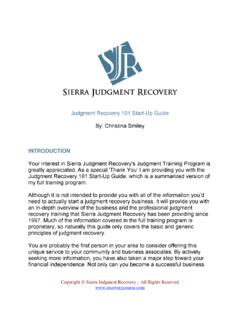Transcription of From Becoming a Critical Thinker ©2004 Robert …
1 From Becoming a Critical Thinker 2004 Robert Todd Carroll all rights reserved 1 Chapter One - Critical Thinking .. intelligence .. is in plentiful supply .. the scarce commodity is systematic training in Critical thinking. --Carl Sagan The true Critical Thinker accepts what few people ever accept -- that one cannot routinely trust perceptions and memories. James Alcock Truth gains more .. by the errors of one who, with due study and preparation, thinks for himself than by the true opinions of those who only hold them because they do not suffer themselves to think. --John Stuart Mill A Problem Imagine you are in charge of airport security at an international airport in Florida. An American Airlines counter-clerk calls to inform you that a person scheduled to get on Flight 1304 to Dallas has refused to board the plane, claiming that she is psychic and she senses that there is a bomb on board.
2 You meet with the psychic and recognize her from the Larry King and Montel Williams shows. You vaguely remember her claiming to have used her psychic ability to solve several important criminal investigations. Aside from being agitated about the bomb, she seems normal. You order everyone off the plane and call in a crew to do a bomb search. No bomb is found but the flight has to be cancelled because some crew members have exceeded their work hours by the time the search is finished. Your action causes hundreds of people to miss their flights. The airline loses money because it has to arrange other flights for the passengers, including one for the psychic. Did you do the right thing? In your defense you claim, In these times, we can't ignore anything. Your boss disagrees. She tells you that to her knowledge no psychic anywhere has ever discovered a bomb using psychic powers. She says that you should not have been impressed that the psychic seemed normal or was famous and had appeared on entertainment programs.
3 She tells you that you should have had the psychic detained and questioned. Your boss considers firing you and sending word to Dallas to have the psychic arrested for making threats against a flight. Who is the better Critical Thinker , you or your boss? Why? 1. What does it mean to think critically? Why are some people better than others at solving problems and making decisions? The answer seems obvious: Some people are smarter than others. But being smart isn t enough. People who follow broad rules like We can t ignore anything are playing it too safe. We should ignore some things because they are improbable. It is unreasonable to do a bomb search on the advice of a psychic tip because there is no evidence that psychic tips are any more reliable than flipping a coin or throwing darts at a board. What if the psychic said that her parrot told her telepathically that there was a bomb on the plane? Would you do a search on such evidence?
4 If you would, you are not thinking very critically. Had you detained the psychic, you might have interrogated her while having her investigated. Has she made these kinds of claims before? What about her claim to have solved crimes using only her psychic powers? Do you think that Larry King or Montel Williams had her claims investigated? (In fact, 2 From Becoming a Critical Thinker 2004 Robert Todd Carroll all rights reserved your boss gets on the Internet and within five minutes finds a Web site that notes that a reputable investigative journalist has dug into the psychic s claims about solving crimes and found that none of her claims were true.) Why are some people better than others at supporting their beliefs and actions with good reasons? Again, the answer seems obvious: Some people have more knowledge or are more eloquent than others. Still, two equally intelligent people can be equally articulate and knowledgeable, but not be equally good thinkers.
5 If only one of them is thinking critically, that one will be better at analyzing and evaluating facts and opinions, sources and claims, options and alternatives. The Critical Thinker will be a better problem-solver and better decision-maker. When we re thinking critically, we re using our knowledge and intelligence effectively to arrive at the most reasonable and justifiable position possible. When we re thinking uncritically--no matter how intelligent or knowledgeable we are--we ll make unreasonable decisions and arrive at unreasonable beliefs or take unjustifiable actions, unless we are lucky and end up making the right choice for the wrong reasons! For example, imagine that the search crew finds a bomb. You re vindicated, right? Not necessarily. If it turns out that the psychic planted the bomb herself in order to make it look like she really had psychic powers so she could advance her career, but you had the plane searched because you thought a psychic might actually be able to know such things by paranormal means, then you made the right decision by pure luck.
6 You should have had the plane searched, but you should have held and interrogated the psychic. If a bomb is found, it would be reasonable to infer that the psychic had non-psychic information about the bomb and might even have been involved in planting it. It would not be reasonable to infer that the psychic is really psychic. As your boss said, there is little, if any, evidence that any psychic anywhere has ever correctly predicted when a bomb had been placed on a plane. On the other hand, there are plenty of examples where people have lied and deceived in order to advance their careers or to get attention. The goal of thinking critically is simple: to guarantee, as far as possible, that one s beliefs and actions are justifiable and can withstand the test of rational analysis. Just what do we do when we re thinking critically? In general terms, we can say that to think critically is to think clearly, accurately, knowledgeably, and fairly while evaluating the reasons for a belief or for taking some action.
7 This is sometimes easier said than done. Later in this chapter we will review some of the main factors that will limit or hinder even the most diligent and intelligent among us from being successful Critical thinkers. But first, let s look at the standards that guide a Critical Thinker . 2. Standards of Critical evaluation From its beginnings in Greece over 2,500 years ago, Western philosophy and science have been primarily public activities. Some of the best minds of each generation have presented their views on important issues for their fellow citizens to accept or reject. Using only the forces of reason and eloquence to persuade, rather than torture or threats of death or damnation, the Critical thinkers of the past developed rules and guidelines for determining beliefs and actions. Their predecessors or contemporaries relied on the authority of ancient texts and customs, or on the power granted them by their social position, to coerce agreement.
8 Critically thinking philosophers and scientists used evidence available to all as they sought to discover the truth and to persuade others to accept their discoveries. It is true that often the arguments and disputations of philosophers have been over questions that are unanswerable in any final sense. It is also true that there is no universal agreement about the methods and standards of evaluation used in these disputes. Nevertheless, much progress has been made in understanding not only the scope and limits of possible knowledge, but also the bases for reasonable belief. Three of the most important areas of philosophy relevant to Critical thinking are logic, epistemology, and ethics. The first two have long and impor-tant histories of making significant contributions to the methods and standards of evaluation now prevalent in science, law, and philosophy. Ethics is most important for its contributions to the standards for evaluating the morality of actions.
9 Logic studies the principles of valid and invalid reasoning. The domain of From Becoming a Critical Thinker 2004 Robert Todd Carroll all rights reserved 3 logic is narrower than the domain of Critical thinking, which is concerned with evaluating the justification of beliefs and actions. Epistemology studies the origin, nature, and limits of knowledge. Socrates One philosopher stands out as having had the greatest influence on our Critical thinking standards: the Socrates (469? 399 BCE) of Plato (470-347 BCE). The unexamined life is not worth living, says the Socrates of Plato s Apology. The Socrates known to us is a figure from Plato s dialogues. For centuries, Socrates has stood as a model of intellectual integrity and inquiry: the ideal Critical Thinker . It is not any particular idea that earned him this reputation. It is his method of questioning and cross-examination of positions that is taken as an ideal for Critical thinking.
10 The technique is known as the Socratic Method--named after the technique he used in Plato s earliest dialogues such as Gorgias, Euthyphro, Apology, and the first part of the Republic. In those dialogues, Socrates takes up such issues as the nature of virtue, piety, or justice, and through a series of questions examines the mean-ings and implications of various views expressed by others. In each case, Socrates is depicted as confronting someone who claims to be an expert. Each expert is depicted as arrogant and self-righteous, without the slightest self-doubt. Socrates leads his antagonists not to the answer but to confusion. What Plato seemed to admire about Socrates was not only his method of cross-examination, but also his humble and skeptical attitude. That attitude was in stark contrast to the arrogance of the priest Euthyphro or the sophist Thrasymachus. Socrates meaning is clear. The arrogant do not examine their views. They are not worth imitating.

